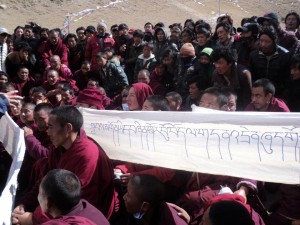
Four Tibetan monks have been released following their incarceration in a Re-education Through Labour (Ch: Laojiao) camp in Yushu Tibetan Autonomous Prefecture in Qinghai Province.
According to information received by TCHRD, four monks from Nyatso Zilkar Monastery: Sonam Gewa, Lobsang Samten, Lobsang Nyima and Tenzin Sherab were released last month from an RTL prison a few months before the completion of their sentence.
Tenzin Sherab was released on 15 July 2013. He was arrested on 1 October 2012 and later sentenced to one year for distributing a newspaper called Mar-jen (Raw Red) that apparently carried contents related to self-immolation protest. Sources say he suffered beatings and torture during detention and in RTL prison, he was forced to work for 16 hours with a brief lunch break making copper wires and gloves in the prison factory.
Both Lobsang Nyima and Sonam Gewa, released respectively on 18 July and 25 July, were subjected excessive hard labour; they had to do some glass work and had to make 650 gloves everyday.
Lobsang Samten was released on 23 July. Local sources say he found the daily mandatory military exercises the most difficult experience.
Lobsang Samten was arbitrarily detained along with Lobsang Nyima and Sonam Gewa on 13 February 2012 from their monastic residence. They were charged of being the ‘ringleaders’ of the non-violent demonstration staged on 8 February 2012 in Trindu (Ch: Chenduo) County, , in Kyegudo in Yushu Tibetan Autonomous Prefecture. About 1400 monks and lay Tibetans joined the peaceful demonstration bearing banners and shouting slogans calling for the return of the Dalai Lama to Tibet; release of the 11th Panchen Lama; equal rights to promote and protect Tibetan language and culture.
Re-education Through Labour (RTL) is the most common and severe form of arbitrary detention.RTL is a remnant of China’s revolutionary period in the 1950s when it was used to imprison “counterrevolutionaries.” The essential elements of RTL have not changed. The police may still unilaterally send somebody to a RTL labor camp for three years with the possibility of a one-year extension.
In 2001, the the United Nations High Commissioner for Human Rights described RTL “inherently arbitrary.” Recently Chinese officials including President Xi Jinping have promised to reform or abolish RTL, however these are merely echoes of the promises China made during its 2009 Universal Periodic Review (UPR). The complete abolishment of RTL system must be addressed during China’s second UPR in October 2013. In practice RTL and other forms of arbitrary detention are used as a means to stifle all forms of political dissent or criticism, and to eliminate perceived threats to state unity or security both in Tibet and in other parts of China.
Nyatso Zilkar Monastery has been targeted repeatedly in recent years. Last month, Tsultrum Kalsang, 25, a monk scholar of exceptional caliber from the same monastery was sentenced to 10 years in prison. Tsultrum Kalsang was among the five monks arrested arbitrarily by People’s Armed Police on 1 September 2012.
Another monk, Sonam Yingyen, 44, was sentenced to two-year imprisonment in October 2012 despite poor health. Lobsang Jinpa, 31, a Nyatso Zilkar monk, was sentenced to five years in prison on 23 February 2012.
Trindu County remains one of the most restricted areas in Yushu Tibetan Autonomous Prefecture.
